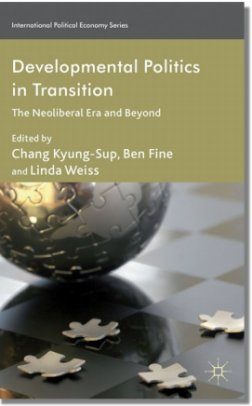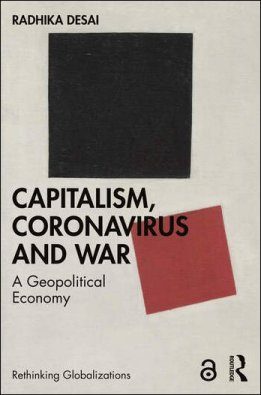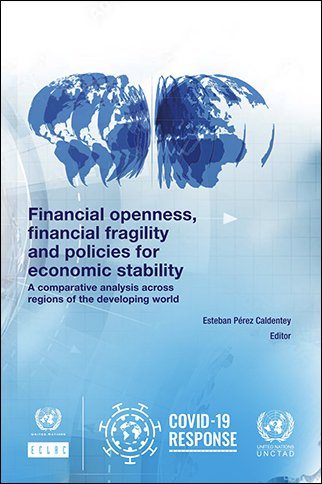Publisher: Third World Network Year: 2023 No. of pages: 42 Download now About the Book…
Developmental Politics in Transition : The Neoliberal Era and Beyond Edited by Chang Kyung-Sup, Ben Fine and Linda Weiss

Publisher: Palgrave Macmillan
ISBN-97802302943
About the Book
In many parts of the world, neoliberalism has not replaced but interacted with national developmentalism in complex and diverse ways. With new constituencies of developmentalism emerging across the globe and with classic developmental political economies restructuring beyond national boundaries, the sociopolitical conditions, processes, and consequences of national development have turned out much more diverse and complex than previously acknowledged.
Concurrently, the structural incongruity across various goals of national progress – such as democracy, social equity and integration, and economic development – has become a prevalent phenomenon across the globe. Using case studies that coverboth post-ISI, post-socialist, post-developmental statist, and post-liberal instances of neoliberal-era developmental politics during the ascendancy of neoliberalism on the one hand and East and South Asian, Latin American, African, European, and Australian experiences on the other, the contributors critically examine various national configurations of developmental politics in the neoliberal era.
Contents
Introduction:
Neoliberalism and Developmental Politics in Perspective
C.Kyung-Sup, L.Weiss & B.Fine
PART I: DEVELOPMENTAL POLITICS AND NEOLIBERALISM: CRITICAL ISSUES
The Myth of the Neoliberal State
L.Weiss
Kicking Away the Ladder: Neoliberalism and the ‘Real’ History of Capitalism
C.Ha-Joon
Neo-Liberalism in Retrospect? – It’s Financialisation, Stupid
B.Fine
Predicaments of Neoliberalism in the Post-Developmental Liberal Context
C.Kyung-Sup
European Welfare States: Neoliberal Retrenchment, Developmental Reinforcement, or Plural Evolutions
P.Abrahamson
PART II: DEVELOPMENTAL POLITICS AND NEOLIBERALISM IN DEVELOPING POLITICAL ECONOMIES
Neoliberalism, Democracy and Development Policy in Brazil
A.Saad-Filho
From Dirgisme to Neoliberalism: Aspects of the Political Economy of the Transition in IndiaC.P.Chandrasekhar
The Transition from Neoliberalism to State Neoliberalism in China at the Turn of the 21st Century
A.Y.So & Y.Chu
Vietnam between Developmental State and Neoliberalism: The Case of the Industrial Sector
P.Masina
New Developmentalism in the Old Wineskin of Neoliberalism in Uganda
J.Kiiza
PART III: DEVELOPMENTAL POLITICS AND NEOLIBERALISM IN ADVANCED POLITICAL ECONOMIES
Neoliberal Restructuring in South Korea Before and After the Crisis
T.Y.Kong
The Irish Social Partnership Model: From Growth Promotion to Crisis Management?
K.Hyeong-ki
From Developmentalism to Neoliberalism and Back Again? Governing the Market in Australia from the 1980s to the Present
E.Thurbon
PART IV: CONCLUSION AND PROSPECT
Developmental Politics beyond the Neoliberal Era
B.Fine & C.Kyung-Sup
About the Authors
CHANG KYUNG-SUP Professor of Sociology and Director of the Institute for Social Development and Policy Research at Seoul National University, South Korea. His research interests include: developmental politics and social policy, comparative modernities, post-socialist transitions in East Asia, etc. His work on these issues has appeared in World Development, Journal of Development Studies, Economy and Society, and the British Journal of Sociology. He recently published South Korea under Compressed Modernity: Familial Political Economy in Transition (2010). He is currently preparing with Bryan Turner an edition on Contested Citizenship in East Asia: Developmental Politics, National Unity and Globalization as well as another book on Developmental Politics in South Korea: From Developmental Liberalism to Neoliberalism.
BEN FINE Professor of Economics at the School of Oriental and African Studies, University of London, UK. His recent books include The New Development Economics: A Critical Introduction, edited with K.S. Jomo (London: Zed Press, 2006); Privatization and Alternative Public Sector Reform in Sub-Saharan Africa: Delivering on Electricity and Water, edited with Kate Bayliss (Basingstoke: Palgrave Macmillan, 2008); From Political Economy to Economics: Method, the Social and the Historical in the Evolution of Economic Theory, with Dimitris Milonakis (London: Routledge, 2009, awarded the 2009 Gunnar Myrdal Prize); From Economics Imperialism to Freakonomics: The Shifting Boundaries Between Economics and Other Social Sciences, with Dimitris Milonakis (London: Routledge, 2009, awarded the Deutscher Memorial Prize); Theories of Social Capital: Researchers Behaving Badly (London: Routledge, 2010); Marx’s Capital, 5th ed., with Alfredo Saad-Filho (London: Pluto, 2010). He is co-editing The World Bank and the Future for Development Research with Kate Bayliss and Elisa van Waeyenberge: and Beyond the Developmental State: Industrial Policy into the 21st Century, with Jyoti Saraswati and Daniela Tavasci.
LINDA WEISS Fellow of the Academy of the Social Sciences in Australia, Professor of Government and International Relations at the University of Sydney, and Honorary Professor of Political Science at Aarhus University, Denmark. She specializes in the comparative and international politics of economic development, with a focus on state capacity and public-private sector relations. Her work on the topics of globalization and state power, developmental states, and trade politics has resulted in numerous books, including The Myth of the Powerless State: Governing the Economy in a Global Era (Ithaca: Cornell University Press, 1998), States in the Global Economy: Bringing Domestic Institutions Back In (edited, Cambridge: Cambridge University Press, 2003), Creating Capitalism: The State and Small Business since 1945 (Oxford: Basil Blackwell, 1988), and How to Kill a Country: Australia’s Devastating Trade Deal with the United States, with Elizabeth Thurbon and John Mathews (Sydney: Allen & Unwin, 2004). She is currently completing a book on Developmental Militarism which examines the developmental role of the U.S. national security state



